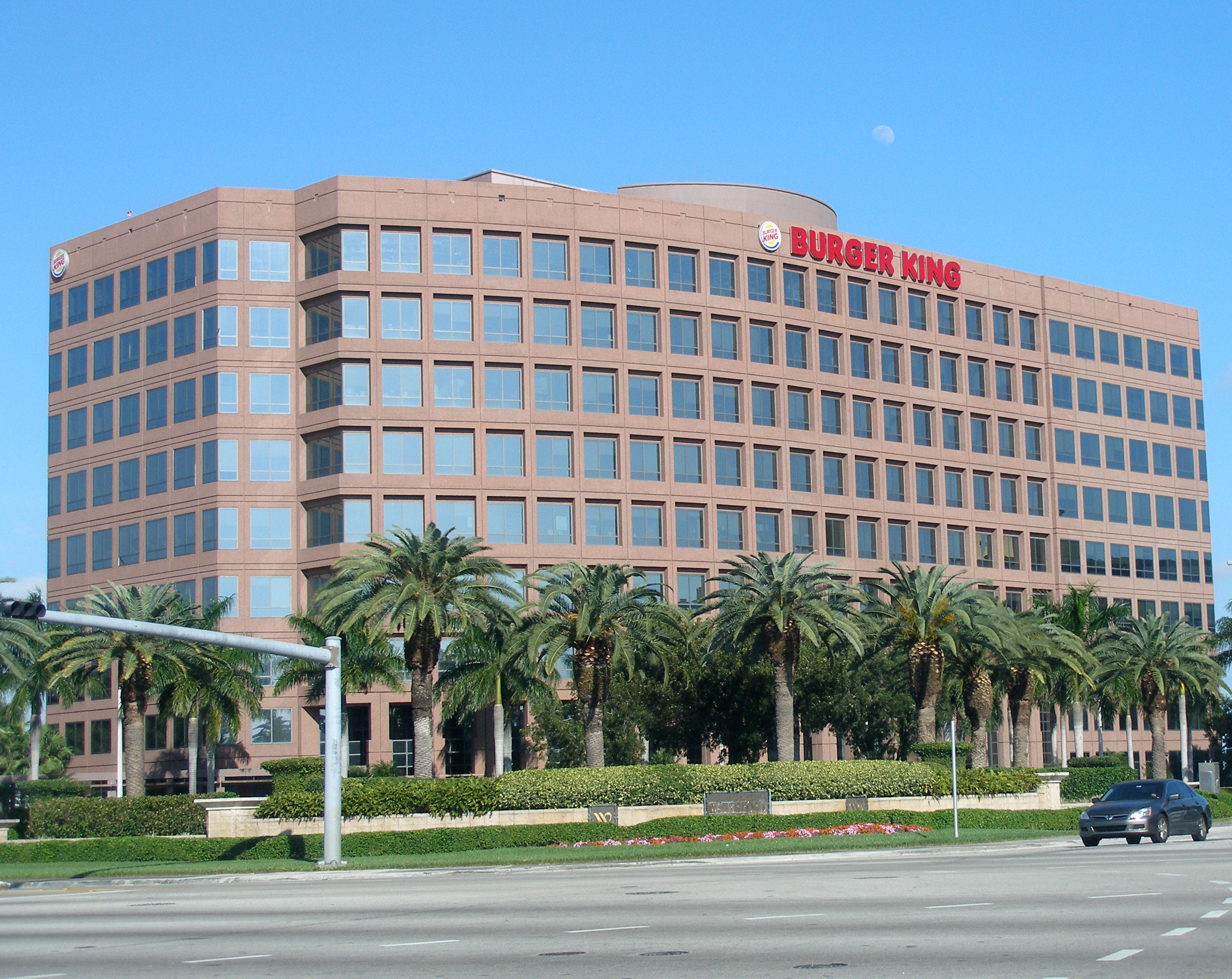One of these things does not belong with the others (but it legally can)
In a recent sign of the strange economic times we now live in, Burger King, the world's second largest hamburger fast food restaurant chain, announced this past Monday its intent to buy the Canadian restaurant and coffee shop chain Tim Hortons for $11.4 billion. The new holding company will become the third largest fast food company with over 18,000 restaurants in 100-plus countries, lagging behind only McDonald's and Yum! Brands. Once approved, 3G Capital, the company's majority stock holder, will move its corporate operations from Miami, Florida to Oakville, Ontario. While big money mergers have become almost commonplace, one significant component of this deal has transcended the confines of Wall Street to spark discussions on Main Street as well as on various social media outlets.
Burger King's current company headquarters in unincorporated Miami-Dade County, Florida (photo courtesy of Wikipedia)
While 3G Capital is a US-based company and Burger King has operated under that name in this country since 1954, the primary motive behind this move to our northern neighbor has brought up questions about their patriotism and the costs of doing business in the United States. According to existing tax laws, corporations based in the US are subject to nominal overall federal and state tax rates as high as 39.1 percent on overseas earnings, the highest seen in the world in 2014. Conversely, Canada's rate comes in at just over 26 percent, a 13 percent saving on paper but not necessarily in practice. I don't pretend to be a business expert but if a CEO didn't take advantage of reducing that fiduciary drag on their company's profits, then they probably shouldn't be in that line of work in the first place.
The Occupy Democrats group calls for a boycott of Burger King due to the recently announced merger (graphic courtesy of OccupyDemocrats.com)
In a move closely coordinated to match that announcement, social media outlets erupted in condemnation of Burger King's pending move to Canada, labeling it a tax dodge and an un-American decision. Both Twitter and Facebook were used to announce widespread boycotts of the hamburger chain's stores to tangibly show consumer displeasure over this most recent example of corporate greed overcoming community or country "citizenship" obligations. A similar "tax inversion" plan by the Walgreen Company, the nation's largest drug retailing chain, to move their headquarters outside the country was recently thwarted by government scrutiny and investor pressures after they purchased the British Alliance Boots health and beauty group earlier this month.
Local and state officials prepare for groundbreaking activities for a Walmart distribution center in Grandview, Washington. The state gave the city a grant of $1 million to pay for infrastructure improvements for the site. (photo courtesy of YCDA.com)
Perhaps it was the international aspect of this merger that unleashed consumer and taxpayer rage that exhibited an almost xenophobic fervor. Unfortunately, that energy is being wasted because tax avoidance has been a long-held corporate strategy and has been exercised as long as corporations have been allowed to exist. I can't recall the number of articles I've read over the years about municipalities rolling out very lucrative "red carpets" in order to attract businesses and industries to their areas. Tax breaks--lengthy periods of paying little to no taxes--are often bundled with transportation and other infrastructure "perks" to either retain an established company or to tempt one to move from their current higher-taxed location. These actions happen at every level of government from governor mansions to county land boards and have been recognized as an acceptable way of doing business in this country.
Questionable menu selections and growing labor issues already plague Burger King and other American fast food outlets. (right photo credit to Rebecca Leber)
I do have one question for 3G Capital's financial advisors...like almost every corporation in America, yours pays nowhere close to that 39 percent tax rate mentioned above. According to 2013 tax records, Burger King paid an overall effective tax rate of only 27.5 percent for that calendar year so the argument of "running for the border" in order to save a lot of money falls flat in light of this information. Sure, every dollar helps the bottom line and what you are doing is perfectly legal but are you willing to tarnish a well established brand for a pennies on the dollar windfall? With existing issues about the "healthiness" of your products and the lack of providing a "living wage" for your employees, why add more problems to your overburdened public relations staff with this fiscally unnecessary move?
Back in 1975, Burger King ran a campaign where their slogan was "We're America's Burger King" in a probable tie-in to the then-approaching US bicentennial anniversary and that appears to be confirmed with the Uncle Sam-like top hat appearing on top of the logo at the end of that commercial clip above. I guess they could revive it in 2014 but will have to add the word "North" between the first two words or perhaps just add one last word to the end of their most recent one...be your way, eh?






No comments:
Post a Comment